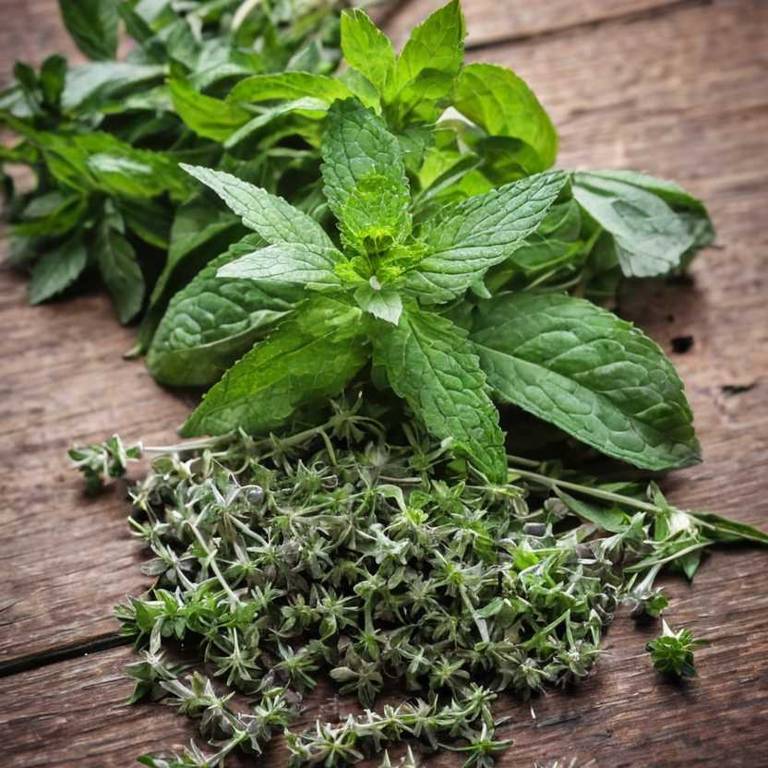Spearmint (Mentha spicata)
Spearmint (Mentha spicata) is a member of the Lamiaceae family, native to Europe, Asia, and North Africa. Traditionally, its leaves, stems, and flowers have been used for infusions, decoctions, and poultices.
This herb is particularly valued for its carminative, antispasmodic, and expectorant actions, and has a long history of use in european herbal medicine, mediterranean herbal traditions, and traditional chinese medicine.

Quick Facts / Key Information
| Common Name | Spearmint |
|---|---|
| Scientific Name | Mentha spicata |
| Plant Family | Lamiaceae |
| Genus | Mentha |
| Species | spicata |
| Native Range | Europe, Asia, North Africa |
| Plant Parts Used | Leaves, Stems, Flowers |
| Primary Medicinal Actions | Carminative, Antispasmodic, Expectorant |
| Primary Traditional Systems | European Herbal Medicine, Mediterranean Herbal Traditions, Traditional Chinese Medicine |
| Historical Preparation Methods | Infusion, Decoction, Poultice |
Botanical Identity
- Scientific Name
- Mentha spicata
- Common Name
- Spearmint
- Synonyms / Alternative Names
- Mint, Spicy Mint, Mentha
- Plant Family
- Lamiaceae
- Genus
- Mentha
Botanical Description
- Growth Habit
- Perennial herbaceous plant.
- Height
- 15 to 30 centimeters tall.
- Leaves
- Ovate leaves with serrated margins, upper surface glandular-pubescent, lower surface glabrous and with prominent stomatal bands.
- Flowers
- Bilaterally symmetric flowers with two-lipped corolla, upper lip two lobes, lower lip three lobes, pale violet to blue flower color, arranged in dense terminal spikes.
- Stems
- Erect, herbaceous, quadrangular, hairy, opposite branching, and with aromatic glandular structures.
Traditional Uses / Historical Use
Traditional Systems
- European Herbal Medicine
- Mediterranean Herbal Traditions
- Traditional Chinese Medicine
- Japanese Kampo Medicine
Historical Preparation Methods
- Infusion
- Decoction
- Poultice
- Oil Infusion
Medicinal Actions
- Carminative
- Traditionally described as a warming carminative, in relation to gastrointestinal comfort.
- Antispasmodic
- In herbal literature, noted as a cooling antispasmodic, for cramp-focused discussions.
- Expectorant
- As described in traditional systems, a soothing expectorant, in chest-related herbal contexts.
- Stimulant
- In herbal texts, considered a moderate stimulant, in activation-oriented uses.
Active Compounds
- Essential Oil
- A complex mixture of volatile compounds produced by aromatic plant tissues.
- Flavonoid
- Plant-based polyphenolic compounds frequently distributed throughout aerial plant parts.
- Terpenoid
- A large class of naturally occurring compounds derived from isoprene units.
- Phenolic Acid
- A group of plant-derived compounds frequently identified in herbal material.
Modern Research Overview
Scientific research related to this plant is ongoing. This section will be expanded in the future to include summaries of phytochemical studies, laboratory research, and other relevant scientific literature as it becomes available.
Safety & Contraindications
- General Precautions
- General precautions have been noted regarding the use of this herb.
- Contraindications
- Reported information suggests that this herb may be contraindicated in specific circumstances.
- Allergies
- Reports indicate that this herb can trigger allergic reactions in susceptible individuals.
- Drug Interactions
- Interactions between this herb and prescription medications are not clearly established.
- Toxicity
- Available information regarding the toxicity of this herb is limited.
- Pregnancy & Breastfeeding
- Safety during pregnancy and breastfeeding has not been well documented.
Preparation & Usage Methods
- Infusion
- Plant material is steeped in hot water to extract water-soluble compounds.
- Decoction
- Plant material is simmered in water to extract compounds from tougher parts.
- Poultice
- Poultices involve external application of prepared plant matter.
- Capsule
- Powdered plant material is enclosed in a capsule for oral consumption.
- Infused Oil
- Oils are infused with plant material over time to absorb constituents.
Growing, Harvesting & Storage
Growing / Cultivation
- Soil
- Prefers loamy soil with moist but well-drained soil. Typically grows best in organically rich soils.
- Sunlight
- Thrives in full sun. Tolerates full sun to partial shade.
- Watering
- Prefers well-balanced moisture levels. Tolerates periodic dry conditions.
Medical Disclaimer
The information provided on this page is for educational and informational purposes only. It is not intended to diagnose, treat, cure, or prevent any medical condition. Always consult a qualified healthcare professional before using any herb for medicinal purposes.